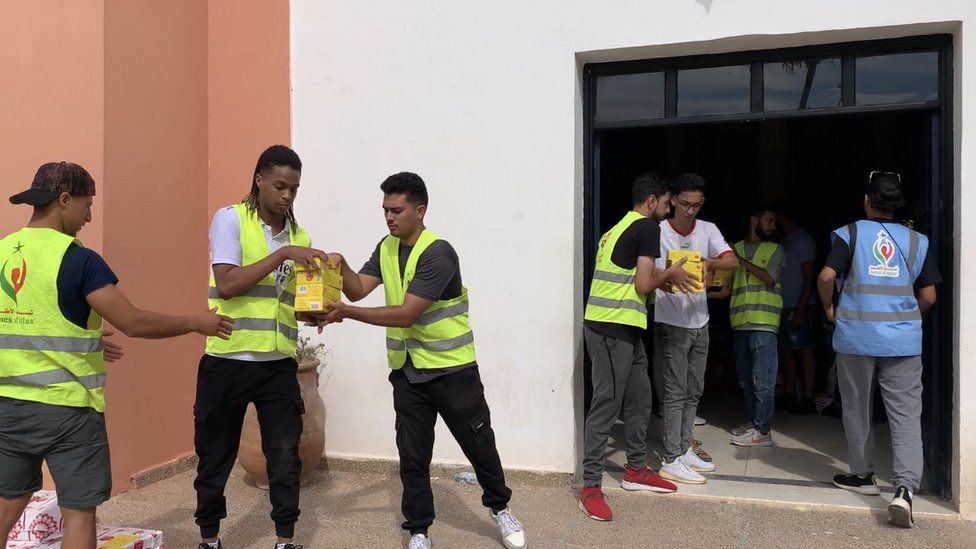-

-
-
Loading

Loading

Morocco's young population is playing a crucial role in the country's relief efforts following a devastating earthquake. Volunteers at Taroudant's youth centre, who have been mobilized through social media, are coordinating the distribution of aid to numerous communities in need. The volunteers are working tirelessly to collect and distribute essential items such as milk, nappies, jam, and bedding. These goods are being passed along human chains and loaded into trucks bound for villages scattered across the Atlas mountains. In many cases, this grassroots effort is proving to be faster and more efficient than official assistance. One young volunteer named Ilyas, aged 21, highlights the urgency of the situation, stating, "People are in danger. If we didn't work so quickly, a lot of people are going to die," as he seals another box of supplies. The Moroccan government has faced criticism for rejecting assistance from certain countries, including France and Germany. However, Amina, a volunteer who has come from the city of Inezgane with her sister Nassib, supports the government's decision. She believes that the country's leaders are more knowledgeable and capable of handling the situation. "Our country knows what it's doing. If we need help, we will ask for it. The government - they know more," Amina states. While donations have been pouring in, the main challenge lies in organizing the aid and swiftly delivering it to affected areas. In Taroudant, the sound of truck engines can be heard as they depart for the mountains. The exact destinations for each mission are determined last-minute based on the urgent requests for help. Priority is given to areas that have yet to receive aid. The earthquake has hit the mountain villages hardest. These remote communities, with their towering peaks and treacherous dirt roads, have been severely impacted. In the village of Ouge Dimt, a man eagerly guides a van carrying rugs, mattresses, and tarpaulins, urgently instructing the driver where to park. The village, home to 40 families, has been devastated, and its residents seek shelter under trees amidst the remnants of their collapsed homes. Yahya Ibrahim, a villager, tragically lost his two teenage sons in the earthquake. Although they initially survived the tremor, they could not be rescued. He accepts their fate, stating, "People lose their loved ones in lots of countries. It has happened here now. This is God's will." The villages of the Atlas Mountains have always lived in a day-to-day, hand-to-mouth manner. Now, with their livelihoods shattered by the earthquake, the aid provided from the city is not only crucial for immediate relief but also for long-term survival. Mina, a resident who returned from the US to care for her parents during the pandemic, explains that the community is still grappling with trauma and is not yet able to think about the future. As rain is forecasted in the coming days, the immediate concern is ensuring that everyone has tents to protect them from the cold and wet nights. Mina is particularly worried about the prospects for the next generation in the village. She gestures towards the pile of rubble and expresses her concern, stating, "The future here is very concerning. If you look at the houses, their life is over. Nobody wants to live in the mountains anymore." These remote villages, which have been forgotten by the world for far too long, hope that they will not be forsaken as attention fades from Morocco's largest earthquake in modern times.